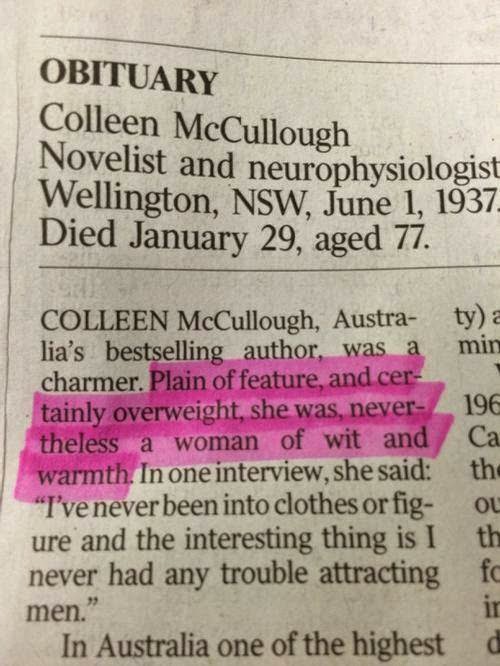I started to write a blog last week about the unfair way older women are treated. The idea came out of the obit for Colleen McCullough, the author of the Thorn Birds, in which she was described as "plain of features and certainly overweight." It seems where sexism meets ageism the joint is particularly sharp.
The anger and derision that shot through Facebook and blogs over that obit resonated with me. It's easy for any women over fifty to come up with her own examples in careers and personal life, and I certainly have stories of being treated unfairly or dismissively because of my age and gender.
Here's just a small, fresh example: the week before the obit went viral we had a sexist/ageist tradesman in our house. Now you have to understand that I am the one in our household who does minor repairs, all the painting, the designing etc. And I am the one who knows what needs to be done when a tradesman arrives. Well, the tradesman who came that week didn't get it, even though I showed him the materials I'd picked and talked to him about the possible ways the job could be done. Throughout his visits, he kept calling Peter "sir" and me "dear,"(over and over before he switched to "honey.") And when he needed to find the electrical panel he walked right past me to Peter's office to ask him where it was.
But my heart's not in writing that blog anymore, I'm just not feeling particularly outraged at the moment. I still believe we have to fight sexism and ageism in the workplace and politics and when it comes up in our daily lives. But the huge outcry over that obit comforted me. And, as the old saying goes, living well is the best revenge. Strong, old women may have the last word yet.
Then I remembered a quote that I'd filed away in my brain although it had no relevance to me when I first heard it. I was a producer involved in an interview with Germaine Greer who had just written a book about women, menopause and aging. In the interview she said that, after menopause, women become invisible and then she laughed. What she said next stuck with me for decades and finally became useful. She said it was wonderful to be invisible; you could do whatever you wanted. At the time I couldn't believe that Germaine Greer, of all people, would enjoy not being seen (and I still don't buy it completely) but it seemed such a liberating statement.
Certainly, there's some pleasure in walking for hours down streets at home and in foreign cities without being eyed or harassed. But there's more to it. Old women can get away with so much. And it is in realizing this power that they can make changes others can not.
That brings me to this week when I watched the remaining Grandmothers of the Plaza de Mayo march around the plaza in front of the Casa Rosada, the Argentinian seat of government, as they have for almost forty years. There are far fewer than the fifty or so women who started the movement and they circle the square three times instead of marching all afternoon. They have their own bus now and sell pins and cards of their iconic white scarves.
But they can not be dismissed as a tourist show. They began marching in the dirty war when generals "disappeared" their children; they demanded to know what had become of their grandchildren, who were often born in prisons and put up for adoption, sometimes to the very military men who had destroyed their families.
Today, there are plaques on the streets of Buenos Aires to commemorate those who disappeared but back then most citizens turned a blind eye out of fear, out of impotency. The military had banned public gatherings but didn't quite know what to do when a group of women in skirts and white scarves started marching with pictures of their loved ones below their windows.
And the women got results. Of the suspected 500 missing children, they have identified more than 100, enlisted an American geneticist, and are credited with creating the Argentine Forensics Anthropology Team. Just last summer the leader of the group, Estella Barnes de Carlotta, then 83, was reconnected with the grandson she had been looking for all those years. A pianist in Buenos Aries, he volunteered to give his DNA to find the truth. The two then met Pope Francis, who had been archbishop of the cathedral next to Plaza de.Mayo during the time the women were marching.
Watching the frail, elderly women march in the 30 degree heat, I was in awe. They are a fierce reminder that old women should not allow themselves to be dismissed, that they are capable of becoming a society's conscience and fighting for what is right. If they choose to, if they don't allow others to define them. Then, those who describe them only through their appearance will be the real dinosaurs. D





Most women i know experience invisibility. I find it a source of annoyance and frustration. My mother sees it as an opportunity to observe and listen when people don't realize you're there. I wrote a long rambling piece about this four years ago on a blog I rarely post to now. Could have used an editor but thought you might find it interesting.
ReplyDeletehttps://saxbergonstuff.wordpress.com/2011/02/19/invisible-women-and-ice-floes/